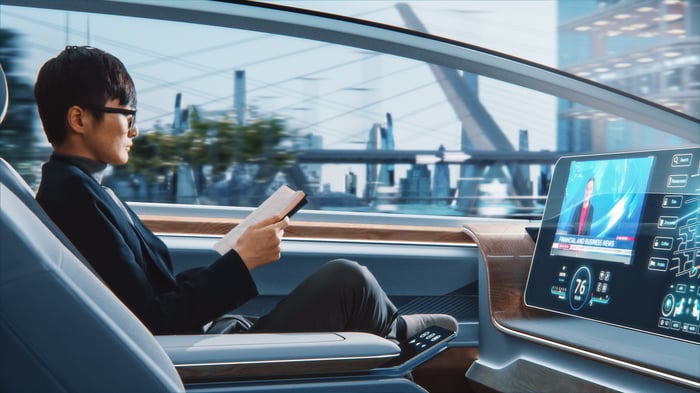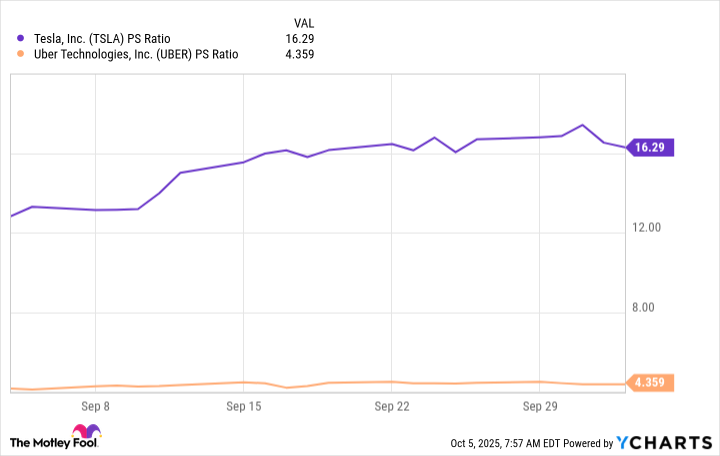Ark Investment Management was founded by seasoned investor Cathie Wood, and it manages around 10 exchange-traded funds (ETFs) that focus on innovative technologies. Each year, the firm releases a new edition of its "Big Ideas" report, and the 2025 version discusses how autonomous vehicles could turn ride-hailing into a $10 trillion industry over the long term.
Tesla (NASDAQ: TSLA) is a leading developer of autonomous technologies. Its new Cybercab robotaxi is scheduled to enter mass production next year, and CEO Elon Musk wants to create a ride-hailing network to autonomously haul passengers around the clock.
However, Tesla might be behind the curve. Uber Technologies (UBER) operates the world's largest ride-hailing network, and it has partnered with at least 20 companies developing autonomous vehicles and delivery robots. Some of them are already completing thousands of paid trips every day.
If you're looking to invest in the autonomous revolution, here's why Uber stock looks like a much better buy than Tesla right now.

Image source: Getty Images.
Tesla will struggle to match Uber's scale
Building a capable self-driving car is only a small part of capturing the autonomous ride-hailing opportunity. Customers won't use a network that doesn't supply a ride in a timely fashion whenever they pull out their smartphone, no matter how good the car is. Uber has perfected the customer experience, which is why 180 million people use its platform every month.
In an August conference call with investors, Uber CEO Dara Khosrowshahi talked about how the company already has the infrastructure in place to succeed in the autonomous era. It has 15 years of experience managing utilization in the world's major cities, which is the secret to running a profitable operation.
For example, if a company doesn't deploy enough cars, it can't provide a convenient user experience. But if it supplies too many cars, 95% of them might sit idle during quiet periods, destroying profit margins.
Therefore, it's no surprise 20 different companies in the autonomous space have partnered with Uber, and that number is growing. One of them is Alphabet's Waymo, which already completes over 250,000 paid autonomous trips every single week across five U.S. cities. It uses a combination of its own network and Uber's network in some cities, but it exclusively uses Uber in Austin and Atlanta.
In July, Uber also partnered with China-based Baidu. It owns the Apollo Go robotaxi service, which has completed over 14 million autonomous trips in China and the Middle East. Therefore, this deal could accelerate Uber's presence in these markets. Uber recently also signed a deal to deploy 20,000 of Lucid's upcoming autonomous electric vehicles over the next six years, which are being developed in partnership with Nuro AI.
Tesla will struggle to compete with the growing number of autonomous brands attaching themselves to Uber's network. The company's full self-driving software isn't even approved for unsupervised use anywhere in the U.S. yet, which could be a roadblock for the Cybercab next year. Moreover, it has to build an entire ride-hailing network from scratch, with no guarantee consumers will adopt it.
Uber stock looks like a bargain relative to Tesla
Autonomous vehicles could transform Uber's unit economics. During the second quarter of 2025 (ended June 30), the company paid a whopping $20.8 billion to its 8.8 million human drivers, which was the single biggest component of its $46.7 billion in gross bookings (the dollar amount customers spent on the platform). If autonomous vehicles can reduce or eliminate that cost, more of Uber's bookings will convert into revenue.
On that note, based on Uber's trailing-12-month revenue of $47.3 billion, its stock is trading at a price-to-sales (P/S) ratio of just 4.3, which is a staggering 73% discount to Tesla's P/S ratio of 16.3 (at the time of this writing).
Uber grew its revenue by 16% during the first half of 2025; whereas, Tesla's revenue shrank by 12%, which makes the valuation gap very difficult to justify.
Tesla stock also trades at a sky-high price-to-earnings (P/E) ratio of 248, so it's seven times more expensive than the Nasdaq-100 index, which has a P/E ratio of 33.4. It's hard to make the case for buying Tesla stock at the current level, independent of anything Uber is doing.
If Ark Invest is right about autonomous ride-hailing becoming a $10 trillion market, it appears Uber is better positioned to capture the opportunity than Tesla as things currently stand. Then, once you factor in the valuation issue, Uber stock also looks like the no-brainer choice for investors who want to own a slice of this new industry.






